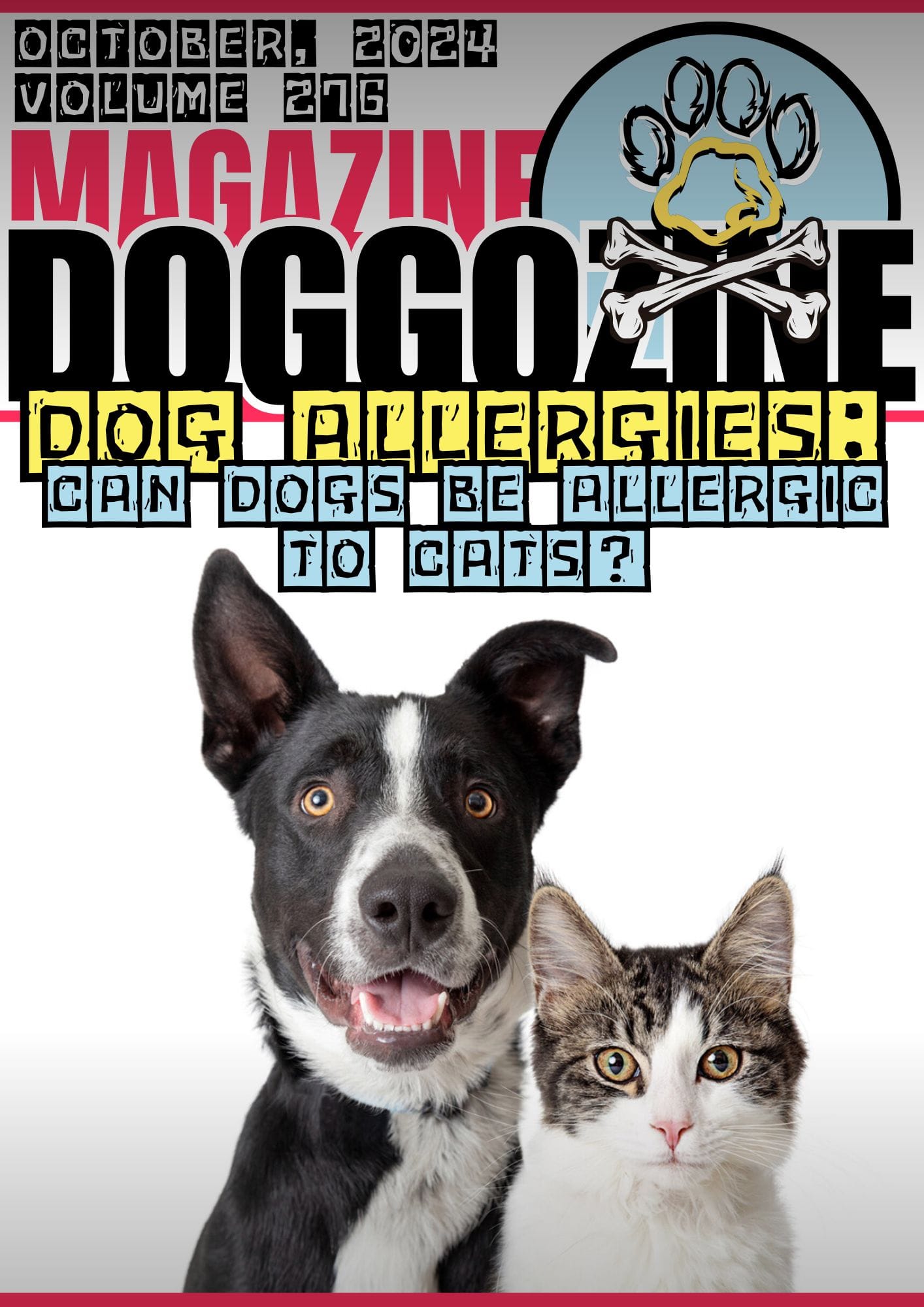
INTRODUCTION TO DOG ALLERGIES
Allergies in dogs are a type of immune response triggered by the exposure to specific substances, known as allergens. Much like in humans, when a dog encounters an allergen, its immune system mistakenly identifies this typically harmless substance as a threat. Consequently, the body produces antibodies that lead to the release of chemicals such as histamines. This immunological response can result in various allergic reactions, manifesting in symptoms that can significantly affect a dog’s well-being. This article will explain about dog allergies and further we will focus on the question if dogs can be allergic to cats!
Detecting The Onset of Allergies Early in Your Dog
Dog allergies can be initiated by a range of allergens, including pollen, dust mites, certain foods, and even other animals. A noteworthy aspect of these allergies is the phenomenon of cross-allergenicity, where allergens from different sources can elicit similar reactions. For instance, some dogs may develop allergies not only to their immediate environment but also to the dander and saliva of cats.
This is particularly important for households with both dogs and cats, as the presence of the latter can exacerbate existing allergic conditions in dogs, leading to increased discomfort and health issues. The symptoms of allergies in dogs can vary widely and may include itching, redness, rashes, excessive licking, and respiratory problems.
In some cases, an allergic reaction can lead to secondary infections, worsening the dog’s condition. It is also notable that while some breeds may be more prone to allergies than others, any dog can develop an allergy at any point in their life. Detecting the onset of allergies early on can be crucial for effective management and treatment.
🔑 Key Points: Importance of understanding the signs and symptoms associated with dog allergies, especially in relation to potential cross-reactivity with cat allergens.

COMMON SYMPTOMS OF DOG ALLERGIES
Allergies in dogs can manifest through a range of symptoms, which often vary in intensity and duration. Understanding these symptoms is crucial for dog owners to address their pets’ health effectively. One of the most frequent manifestations of allergies in dogs is sneezing. This occurs as the dog’s body attempts to expel allergens that may have entered the nasal passages, leading to discomfort and irritation.
Dog Itching
Itching is another prevalent symptom associated with allergic reactions in dogs. This can result from a variety of allergens, such as pollen, dust mites, or even food ingredients. Intense itching often leads dogs to scratch or bite at their skin excessively, which can cause further irritation and potentially lead to secondary skin infections. In severe cases, this can result in hot spots, a condition where the skin becomes inflamed and moist due to constant scratching.
Skin Irritation
Skin irritation is commonly observed alongside itching and can include rashes, redness, and hives. Allergic reactions may cause a significant change to the dog’s skin condition, making it important for owners to monitor their pets closely. Affected areas can become raw and painful, requiring veterinary intervention to manage properly.
Ear Infections
Ear infections are another alarming symptom associated with dog allergies. Dogs suffering from allergies often exhibit signs such as shaking their heads, scratching at their ears, or allowing their ears to become very warm. Ear infections can be a consequence of allergies since the inflammation and moisture can create an ideal environment for bacteria or yeast to flourish, leading to further complications.
🔑 Key Points: Recognizing these symptoms early on can aid in effective management and treatment, ensuring the well-being of the affected dog. Regular veterinary checkups are essential in diagnosing the specific allergies and developing a tailored treatment plan.

UNDERSTANDING ALLERGENS THAT EVOKE IMMUNE RESPONSES IN DOGS
Allergens are substances that can provoke allergic reactions in sensitive individuals, including dogs. When it comes to cats, the primary sources of these allergens are dander, saliva, and urine. Cat dander consists of tiny, microscopic flakes of skin that are constantly shed, while cat saliva contains proteins that are able to evoke immune responses in dogs. The impact that these allergens have on a dog’s immune system can vary significantly based on the genetic predisposition of the individual dog.
Be Careful from Cat Dander and Saliva
The proteins found in cat saliva, such as Fel d 1, are known to be particularly potent. When cats groom themselves, they often spread saliva onto their fur and skin. Once the saliva dries, it flakes off, dispersing the allergenic proteins into the air and onto surfaces.
This process can expose dogs to these allergens, leading to a range of possible reactions. Following exposure, a susceptible dog’s immune system may mistakenly identify the cat allergens as harmful invaders, resulting in an array of symptoms including itching, sneezing, and respiratory distress.
Cat Urine Can Cause Allergic Reaction in Dogs
In addition to dander and saliva, cat urine is also a contributor to allergic responses in dogs. When cat urine dries, it can leave behind allergens that can remain in the environment for extended periods, further exacerbating a dog’s allergic reactions.
Understanding the biochemical nature of these allergens is essential for pet owners who may be concerned about the potential effects on their dog’s health, as managing exposure to these allergens is key in minimizing allergic responses. It is crucial for dog owners to observe their pets closely for any allergic reactions, particularly if they have had exposure to cats.
🔑 Key Points: Recognizing the specific allergens involved allows for better management strategies to be implemented to ensure the well-being of both dogs and their feline counterparts.

DIAGNOSING ALLERGIES IN YOUR DOG
Diagnosing allergies in dogs involves a systematic approach that begins with a thorough physical examination by a veterinarian. During this examination, the veterinarian will assess the dog’s overall health and look for visible signs of allergic reactions, such as skin irritations, rashes, or inflammation. This initial assessment helps in evaluating the extent of the allergy symptoms and determines subsequent steps in the diagnostic process.
Diagnosing Allergies from The Medical History Of Your Dog
One of the most crucial components of diagnosing allergies is obtaining a comprehensive medical history from the dog owner. This history includes information about when the symptoms first appeared, any potential exposure to allergens, dietary habits, and previous medical conditions. Understanding the dog’s environment and lifestyle can provide valuable insights into possible triggers, such as exposure to cats, pollen, dust mites, or food ingredients.
Allergy Tests
Once a physical examination and medical history have been reviewed, veterinarians may recommend allergy tests to pinpoint the specific allergen responsible for the dog’s symptoms. There are primarily two types of allergy tests for dogs: skin testing and blood testing. Skin tests involve placing small amounts of various allergens on the dog’s skin to observe any immediate allergic reactions. This method is generally effective for identifying environmental allergies, including potential sensitivities to cats.
Blood Tests
Blood tests, on the other hand, measure the levels of immunoglobulin E (IgE) antibodies in the dog’s bloodstream in response to specific allergens. While less commonly used than skin testing, blood tests can be useful when skin testing is not feasible or when the dog is heavily medicated. These diagnostic methods, combined with a detailed medical history, equip veterinarians with the necessary tools to accurately evaluate and manage allergies in dogs. Understanding the diagnostic process is the first step in ensuring appropriate care and treatment for dog allergies.
🔑 Key Points: Diagnosing allergies in dogs involves a systematic approach that begins with a thorough physical examination by a veterinarian.

MANAGING DOG ALLERGIES: TREATMENT OPTIONS
Managing allergies in dogs requires a comprehensive approach that includes both medical treatments and lifestyle adjustments. One of the primary treatment options for canines suffering from allergic reactions is the use of antihistamines. These medications, similar to those used in humans, work by blocking the action of histamines, which are released during an allergic response. Common antihistamines prescribed by veterinarians include diphenhydramine and cetirizine, which can help alleviate symptoms such as itching, sneezing, and runny eyes.
Managing Dog Allergies with Antihistamines and Corticosteroids
Corticosteroids are another viable option for managing dog allergies, particularly in cases where antihistamines are ineffective. These powerful anti-inflammatory medications can quickly relieve severe allergic reactions; however, they should be used cautiously and under veterinary guidance due to potential side effects, such as increased thirst and appetite, and long-term health impacts. When considering corticosteroids, it is crucial to consult a veterinary professional to ensure the safety and efficacy of the treatment plan.
Managing Dog Allergies with Immunotherapy
Immunotherapy, or allergy shots, represents a long-term solution for dogs with persistent allergies. This treatment involves gradually exposing the dog to small amounts of the allergens to build up tolerance over time. While this can be an effective option, it requires a commitment of time and monitoring, as it may take several months to see improvements.
In addition to pharmacological treatments, lifestyle changes can significantly impact a dog’s allergy management. Maintaining a clean environment by frequently washing bedding, vacuuming, and using air purifiers helps to minimize allergens. Regular grooming can also help reduce the accumulation of dust, pollen, and dander in a dog’s coat.
🔑 Key Points: By integrating these management techniques, caregivers can effectively alleviate symptoms and improve the quality of life for dogs affected by allergies.

WHAT TO DO IF YOUR DOG IS ALLERGIC TO CATS
When a pet owner discovers that their dog is allergic to cats, it can be concerning, especially if the household includes both animals. The first step is to recognize the symptoms of dog allergies. Common signs may include excessive itching, skin irritations, sneezing, watery eyes, and gastrointestinal issues. If you suspect your dog is displaying these symptoms after coming into contact with a cat, it’s crucial to take action swiftly.
Keep Your Dog Away from Your Cat If Possible
One practical approach is to establish a safe space for your dog away from the cat. Designating specific areas in the home where the dog can retreat, free from cat allergens, helps in their comfort and health. Use baby gates or closed doors to create boundaries. Additionally, utilizing air purifiers with HEPA filters can significantly reduce airborne allergens in these shared spaces, promoting a healthier environment.
Maintain A Regular Grooming for Both Your Pets
Another method of managing this situation is to maintain a regular grooming schedule for both the cat and the dog. Regular baths, particularly for the dog, can aid in reducing the potential buildup of allergens. Frequent brushing of the cat helps minimize shedding and dander. Make sure to choose hypoallergenic shampoos and grooming products to support your dog’s skin health.
Consult With a Veterinarian
It is also advisable to consult with a veterinarian, particularly if symptoms persist or worsen. A vet can conduct allergy testing to determine if your dog is indeed allergic to cats, and they can offer guidance on potential treatments, such as antihistamines or corticosteroids. If your dog’s reaction is severe, your veterinarian might suggest more advanced management strategies, including immunotherapy.
In conclusion, navigating the dynamics between a dog and a cat when allergies are present requires careful planning and proactive measures. By creating separate spaces, maintaining grooming routines, and consulting with a veterinarian, pet owners can help ensure a harmonious coexistence despite dog allergies.
🔑 Key Points: Regular observation and a willingness to adapt are key components of managing such allergies effectively.

CAN CATS BE ALLERGIC TO DOGS? A RECIPROCAL VIEW
In exploring pet allergies, it is crucial to consider that cats can also develop allergies to dogs. As with dog allergies, feline sensitivity can manifest through various symptoms, including sneezing, itching, and skin irritations. These reactions occur due to proteins found in dog saliva, urine, and dander, which can provoke an allergic response in some sensitive cats.
Common Feline Allergies
The underlying mechanisms of these allergies are comparable to those in dogs, where exposure to the allergen triggers an immune response leading to discomfort and health issues. Symptoms of a cat allergic to dogs might resemble those of other common feline allergies. Owners should be observant for signs such as excessive grooming, ear infections, and respiratory issues.
This careful monitoring is necessary for timely intervention, as prolonged exposure to allergens can lead to more serious health complications. Interestingly, the prevalence of dog allergies in cats may be less understood and often underestimated, yet it remains a significant issue for many households where both cats and dogs coexist.
Management Of Cat Allergies to Dogs
Management of cat allergies to dogs involves several strategies, focusing on reducing exposure to allergens. Maintaining a clean environment is essential; regular grooming of both pets, frequent vacuuming, and using air purifiers can minimize dander and saliva spread. If symptoms persist, veterinarians may recommend antihistamines or other medications to alleviate discomfort. In cases of severe allergies, it might even be necessary to reconsider living arrangements for the pets to ensure their well-being.
Overall, acknowledging that cats can be allergic to dogs creates a more comprehensive understanding of pet allergies. This knowledge emphasizes the importance of vigilance and proactive management in preserving the health of both dogs and cats within a shared home environment. By prioritizing the health needs of both species, pet owners can foster a harmonious coexistence, ultimately enhancing the quality of life for all animals involved.









